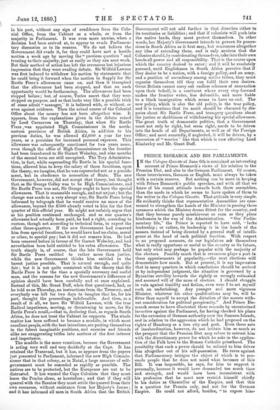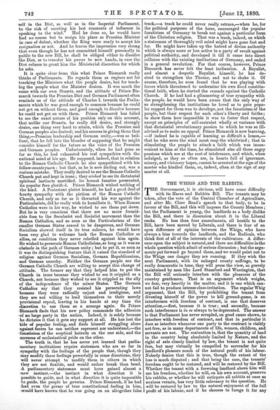PRINCE BISMARCK AND HIS PARLIAMENTS.
IN the Cologne Gazette of June 6th is contained an interesting 1 account of Prince Bismarck's views of his relation to the Prussian Diet, and also to the German Parliament. Of course, these interviewers, German or English, must always be taken with a certain reserve. But nothing can be more in keeping with Prince Bismarck's public speeches, and with all that we know of his recent attitude towards both these assemblies, than the mode in which he seems to have spoken of them to the writer in the Cologne Gazette. That attitude is very simple. He evidently thinks that representative Assemblies are sum- moned to strengthen the hands of the Minister in passing those measures which the Minister deems fittest for the country, and that they become purely mischievous so soon as they place hindrances in the way of the Administration. "Our Parlia- mentary life," the Prince is reported to have said, "lacks leadership ; or rather, its leadership is in the hands of the masses, instead of being directed by a general staff of intelli- gence at the head of each political fraction. With respect to no proposed measure, do our legislators ask themselves what is really opportune or useful to the country or its future, but only what may perhaps be popular with the majority of the electors. Possibly much that is erroneous plays a part in these appraisements of popularity,—the next elections will demonstrate how much. But at present, it is my impression that in many quarters in which conclusions should be arrived at by independent judgment, the situation is governed by a Byzantine servility towards the rightly or wrongly estimated and assumed will of the mass of electors. I should struggle in vain against timidity and fiction, even were I to set myself such an undertaking. Any younger and more vigorous Minister, whatever his other qualifications may be, will be fitter than myself to accept the dictation of the masses with- out consideration for political perspicacity." And Prince Bis- marck seems to have illustrated these remarks by unrestrained invective against the Parliament, for having checked his plans for the extension of German authority over the Samoan Islands, and in relation to the aggression which he had proposed on the rights of Hamburg as a free city and port. Even these acts of insubordination, however, do not . irritate him so much as the prospect that the Prussian Diet may refuse to entrust him with the discretionary power for which he asks in the applica- tion of the Falk laws to the Roman Catholic priesthood. The possibility that such a power should be refused to him drives him altogether out of his self-possession. He raves against that Parliamentary intrigue the object of which is to per- suade people that he does not mind what becomes of this Bill. It was impossible, he says, for him to support it personally, because it would have demanded too much time and strength, and would have been inconsistent with his profession that he must now restrict himself chiefly to his duties as Chancellor of the Empire, and that this is a question for Prussia only, and not for the German Empire. He could not afford, besides, "to expose him-
-self in the Diet, as well as in the Imperial Parliament, to the risk of exerting his last remnants of influence in speaking to the wind." Had he done so, he would have had no course but to resign his place as Prussian Minister in case of defeat, whether the King were ready to accept his resignation or not. And he leaves the impression very strong that even though he has not committed himself personally in public to the new Bill, he shall be obliged either to dissolve the Diet, or to transfer his power to new hands, in case the Diet refuses to grant him the Ministerial discretion for which he asks.
It is quite clear from this what Prince Bismarck really -thinks of Parliaments. He regards them as engines not for teaching the Ministers what the people desire, but for teach- ing the people what the Minister desires. It was much the same with our own Stuarts, and the attitude of Prince Bis- marck towards the Prussian Diet and German Parliament often reminds us of the attitude of Charles L towards the Parlia- ments which he was good enough to summon because he could not get on without them, and good enough to dissolve because he could not get on with them. Prince Bismarck has failed to see the exact nature of his position only on this account, that unlike our Stuarts, he really did desire, and strongly -desire, one thing very hard to attain, which the Prussian and German peoples also desired; and his success in giving them that • thing,—Prussian leadership and German unity,—was so bril- liant, that he fell into the blunder of supposing that he might -consider himself for the future as the voice of the Prussian and German peoples. Unfortunately, when he had gone so far as this, he had exhausted his real sympathies with the national mind of his age. He supposed, indeed, that in relation to the Roman Catholic Church he also sympathised with his fellow-countrymen ; but that, as he is now finding out, was a curious mistake. They really desired to see the Roman Catholic Church put and kept in irons ; they wished to see its dictatorial spiritual instincts mortified, its honest fanatics persecuted, its popular fbes glorified. Prince Bismarck wished nothing of the kind. A Protestant pietist himself, he had a good deal of -hearty sympathy with the pietism of the Roman Catholic Church, and only so far as it thwarted his war against the Particularists, did he really wish to humiliate it. When Roman Catholics were in his way, he wished to see them put down. But he is very conscious that there are no more formid- able foes to the Secularist and Socialist movement than the Roman Catholics, and so soon as the Particularism of the smaller German States ceased to be dangerous, and German Socialism showed itself in its true colours, he would have been very glad to welcome back the Roman Catholics as allies, on condition they never rebelled against him again. He wished to persecute Roman Catholicism, so long as it was an -obstacle in the path of German unity ; but to pet it, so soon as it was its distinguishing feature that it raised the standard of religion against German Socialism, German Republicanism, and German anarchy. Neither the German people nor the -German Catholic Church are willing to accept this change of attitude. The former say that they helped him to put the Church in irons because they wished to see it crippled as a Church, not because they wished to see it crippled as the ally of the independence of the minor States. The German Catholics say that they resisted his persecuting laws because they were radically unjust and irreligious, and they are not willing to lend themselves to their merely provisional repeal, leaving in his hands at any time the discretion to use them as a scourge again. So Prince iBismarck finds that his new policy commands the adhesion ,of no large party in the nation. Indeed, it is solely because he dictates it that it gets any support at all. He has lost the tide of popular feeling, and finds himself struggling alone against forces he can neither represent nor understand,—the tfanatioism of the sceptical hatreds on the one side, and the soreness of ecclesiastical pride on the other.
The truth is, that he has never yet learned that parlia- traentary institutions require statesmen who are so far in sympathy with the feelings of the people that, though they may modify these feelings powerfully in some directions, they will never attempt to modify them in others in which they are not flexible, and would rather break than bend.
A. parliamentary statesman must have gained almost a 'new instinct,—the instinct in what direction it is -possible to guide, and in what direction it is quite impossible to guide, the people he governs. .Prince Bismarck, if he had had even the germs of true constitutional feeling in him, would have knowu that he was going on an altogether false
track,—a track he could never really retrace,—when he, for the political purposes of the hour, encouraged the popular fanaticism of Germany to break out against a particular form of the Christian religion. That was a track, indeed, on which a statesman of thoroughly evil mind might have gone fast and far. He might have taken up the hatred of divine authority which is always more or less active in a party of revolt against political authority, and developed it till it came into direct collision with the existing institutions of Germany, and ended in a general revolution. For that course, however, Prince Bismarck has never felt the least inclination. A Royalist, and almost a despotic Royalist, himself, he has de- sired to strengthen the Throne, and not to shake it. Of course, therefore, he soon found that he was playing with forces which threatened to undermine his own fixed constitu- tional faith, when he started the crusade against the Catholic Church. If he had had a glimmering of true sympathy with the people, he would have been aware that the only way of so strengthening the institutions he loved as to gain popu- lar support for them was to develope, not the fanaticism of the people, but their respect for each other's liberty and faiths ; to show them how impossible it was to foster that respect, except on principles of self-restraint wholly at variance with that dictatorial revolutionary passion to which he was so ill- advised as to make an appeal. Prince Bismarck is now learning, —if indeed he is capable of learning so difficult a lesson,— that he who sows the wind must reap the whirlwind ; that in stimulating the people to attack a faith which was incon- venient to him at the time, he stimulated also all those angry passions which are at the root of intolerance, and which, when indulged, as they so often are, in hearts full of ignorance, misery, and visionary hopes, cannot be arrested at the sign of the master who kindled them, or, indeed, often at the sign of any master at all.



































 Previous page
Previous page